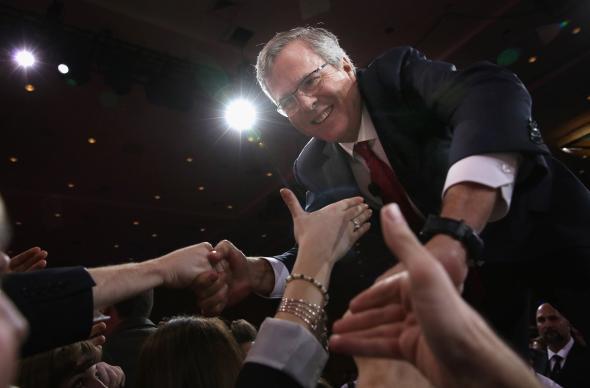Jeb Bush has finally found a policy issue he’s comfortable breaking with his brother on: spending.
The White House hopeful spent months brushing off questions about where his views differ from George W. Bush’s—an awkward dynamic highlighted by his repeated struggles last week to answer a simple question about the 2003 Iraq invasion—but on Thursday, Jeb offered up his most pointed criticism (a relative term) of his brother’s presidency to date.
“Are there differences? Yeah, I mean, sure,” Bush said in response to a question from a voter at a campaign event at a New Hampshire sports bar. “I think that in Washington during my brother’s time, Republicans spent too much money. I think he could have used the veto power—he didn’t have line-item veto power, but he could have brought budget discipline to Washington, D.C.”
Jeb’s remarks are only noteworthy because of his last name. You’ll be hard-pressed to find any Republican presidential contender who thinks that any administration should have spent more money, not less. In that regard, his answer was a political gimme. Nonetheless, Jeb was careful to assign most of the blame to congressional Republicans and, in his next breath, also quick to soften the blow to his older brother’s ego.
“That seems kind of quaint right now given the fact that after he left, budget deficits and spending just like lit up astronomically,” the former Florida governor added, making no mention of the fact that a sizeable chunk of that increase was the result of two Great Recession-era stimulus packages, one of which was signed into law by his brother. “But having constraints on spending across the board during his time would have been a good thing.”
Given how long Jeb Bush’s team has had to prepare for that question, it’s clear that the response was a calculated one. Fiscal discipline is a position that plays particularly well in New Hampshire, which holds the nation’s second nominating contest. His remarks also tell us plenty about the general hawkishness of the GOP field, given that Bush was willing to say his brother’s presidency should have included less spending, but has been unwilling to concede that it should have included fewer wars.
